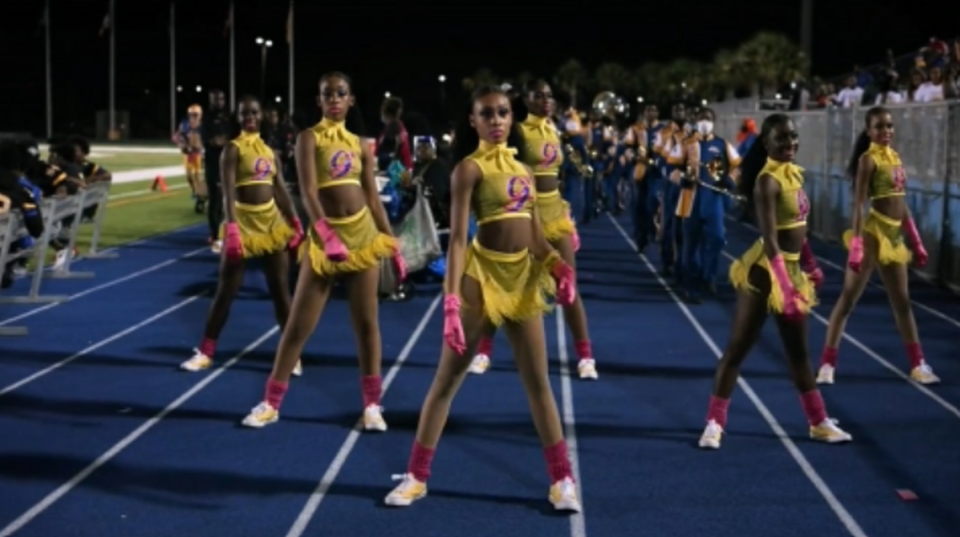Docuseries highlights Miami Northwestern high school’s dance team and their star coach
There’s something very special about the Miami Northwestern Senior High School’s Golden Girlz.
Is it the outfits? Maybe. Is it the routines? Sure, that’s important. Is it the famous Supa Strut? That definitely plays a role.
The true source of the Golden Girlz’s (G Girlz) greatness, lies in their coach of the last 16 years: Traci Young-Byron. A Miami native and Northwestern alum, Young-Byron revolutionized her alma mater’s dance squad when she took over in 2008. Now, Young-Byron and her dance squad are once again in the national spotlight thanks to the recently released six-part docuseries “Supa Girlz,” the final episode of which debuted Thursday via streaming service ALLBLK.
“I wanted to be a part of something that would be meaningful, something that wasn’t scripted, something that would be impactful that talked about the community and highlighted the girls and myself in a way that we would be proud of,” Young-Byron told the Miami Herald.
The docuseries follows Young-Byron as she preps the G Girlz for the 2021-22 season, a particularly trying time considering it was the first full in-person school year amid the COVID-19 pandemic and many of her dancers had graduated. Through a combination of interviews, archival material and behind-the-scenes footage, the series lifts the veil behind how one of the most prestigious dance programs emerged from Liberty City, one of Miami’s most historically underserved communities.
“This is a perfect opportunity to showcase the dancers, showcase myself, showcase Liberty City, the history of how it all came about,” Young-Byron said.

“Supa Girlz” producer and director Trishtan Williams discovered Young-Byron and the G Girlz while attending a 2018 Northwestern game. At the time, she was completing the docuseries entitled “Warriors of Liberty City,” which explores how the eponymous neighborhood produces a significant amount of NFL talent thanks to Luther “Uncle Luke” Campbell of 2 Live Crew fame. She was immediately struck by the squad’s skill and told Young-Byron that she would shoot a documentary on her.
“I just felt like this woman was so compelling and those girls were so magnetic,” Williams said. A former dancer herself, Williams couldn’t help but be impressed “seeing another African American woman who was doing something so profound in having these girls train to a level that I have never seen in a high school team.”
That’s because Young-Byron doesn’t play. A dancer since the age of 3, whose resume includes Florida A&M’s dance program and the Miami Heat, Young-Byron not only owns her own company, Young Contemporary Dance Theater, but she makes her dancers undergo rigorous training. The girls learn a little bit of everything – ballet, modern, jazz, hip-hop, classical, tap, West African - and must adhere to Young-Byron’s high standards, which include completion of an intense, 8-week summer conditioning course, staying out of trouble and maintaining at least a 3.0 GPA. Young-Byron even cut her own cousin for flicking off the camera in an Instagram video.
“You can’t be a regular teenager and still try to be a G Girl,” Young-Byron’s cousin Imani McNichols said in the docuseries. “It just doesn’t balance.”
The results, however, speak for themselves.
“These girls are intellectual young ladies,” Young-Byron said. “My graduation rate and my collegiate acceptance rate is 99.9%. They all go to college. A lot of these girls have over 4.0 GPAs.”

Young-Byron describes her training as preparation “for the outside world.”
“When I grew up dancing, the world wasn’t so accepting of dark chocolate girls being in the industry,” Young-Byron said. Tough love is necessary “in order for them to exist in our spaces and beyond, they have to be strong. They have to have thick skin. They have to be able to be told no. It’s not reality to be accepted all the time.”
The comments that she’s being too hard on the teenagers often reveal the double standards women in sports experience, she said.
“Anytime you raise your voice you’re deemed the ‘angry Black woman’ but think about how many baseball coaches, football coaches, track-and-field coaches, basketball coaches who are male” do the same thing without the pushback, Young-Byron said. “The same rigor that it takes to be successful in the athletic world as a Black male, it’s the same exact thing for a Black female athlete or artist, if not more.”
Williams compared Young-Byron’s dedication to that of her own mother. Raised in South Central Los Angeles, Williams couldn’t help but see a little bit of her hometown in Liberty City.
“Just seeing the community, which was equivalent to where I came from, and seeing this woman pushing this community of girls, that reminded me of my mother,” Williams said. “You need someone to push you so that you can know there’s more out there.”
Projects like these have the ability to “raise standards for Black women” and girls, according to Williams who fought extremely hard for “Supa Girlz” to find a home. Over a span of nearly five years, Williams pitched the project to numerous streaming services before going with ALLBLK.
“What I wanted was to show a polished, legitimate African American woman who wasn’t displaying anything derogatory,” Williams said. “If we don’t do it, they’re not going to do it.”
National attention, however, is nothing new for the G Girlz. Every so often, one of their routines – like when Northwestern football legend and recently hired head coach Teddy Bridgewater did the famous Supa Strut – goes viral. One of the “Supa Girlz” episodes is quite literally named “Go Viral or Go Home.” When asked about the inspiration behind some of the more viral outfits, Young-Byron makes it very clear that she’s the real queen bee.
“No, Beyoncé is inspired by me,” Young-Byron quipped, letting out a slight chuckle. “Beyoncé has tapped into our world, the dance line world. We haven’t tapped into hers. I say that humbly and respectfully but that’s the truth.”


